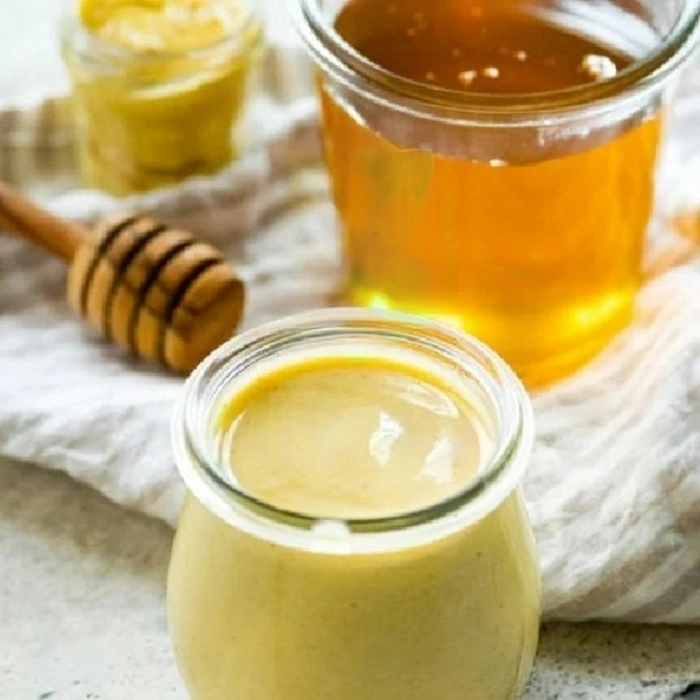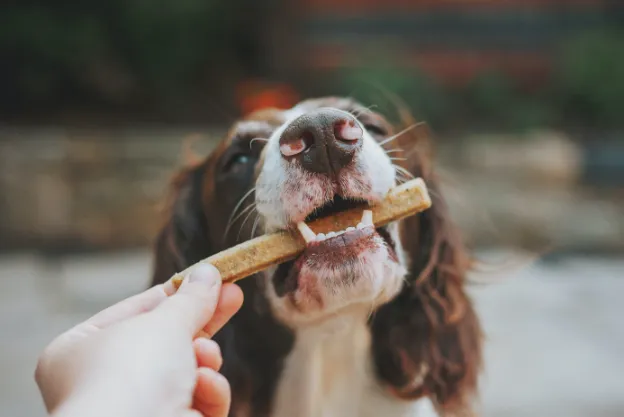103 BEST Tips Can Dogs Eat Honey Mustard (Facts)

-
Can Dogs Eat Honey Mustard - Quick Answer:
-
Can Dogs Eat Honey Mustard - Full Answer:
-
What happens if dogs eat honey mustard, mustard powder, yellow mustard?
-
Do dogs like honey mustard?
-
What should I do if my dog eats mustard?
-
Risks associated with the dog eating honey mustard
-
Is it the same if dog eats just small amount or moderate amounts of honey mustard?
-
Dog owners should exercise caution when...
-
What foods are toxic to dogs?
-
List of foods that are toxic to dogs?
-
What should dogs not eat at all?
-
List of foods that dogs should not eat at all?
-
Signs that indicate if a food is not suitable for canine consumption.
-
Health concerns related to certain foods that should be avoided by canines
-
Popular myths about what can and cannot be fed to a dog.
-
Can dogs be fed raw bones or cooked bones?
-
Feeding of a dog and raw food diet and cold cuts?
-
How is a dog's digestive system structured and how does it work?
-
Your Questions: what to do if the dog ate white wine, horseradish, peanut butter, egg yolks, french fries, barbecue sauce, etc...?
-
Dog mustard greens or dog mustard seeds
-
What American Veterinary Medical Association says about dog's food?
-
Remember the Dog is your Furry Friend and treat her or him like a FRIEND.
-
Related Posts:
-
Please note
Disclosure: Some of the links in this article may be affiliate links, which can provide compensation to me at no cost to you if you decide to purchase. This site is not intended to provide financial advice and is for entertainment only.
Can Dogs Eat Honey Mustard - Quick Answer:
Better not. There are some toxic ingredients inside - more below:
Can Dogs Eat Honey Mustard - Full Answer:
My pup went rogue...
My pup went rogue and snatched up a jar of honey mustard - like there was no tomorrow!
Licking away with ecstatic glee, it seemed nothing would satisfy its cravings.
But is giving your dog condiments really what the vet ordered?
Below comprehensive answer to an evergreen question: can dogs eat honey mustard?
What happens if dogs eat honey mustard, mustard powder, yellow mustard?
(1/103) When it comes to honey mustard, the verdict is out on whether or not dogs should eat it.
This is because honey mustard can contain ingredients that can be toxic to dogs such as garlic and onions, which could lead to gastrointestinal problems, gastrointestinal upset or worse.
If a dog accidentally consumes honey mustard with these ingredients, they may experience vomiting, diarrhea, abdominal pain, stomach pain and dehydration.
Prize : $129.95
That being said, the ingredients used in most store-bought honey mustards are generally safe for dogs but should still be avoided when possible.
(2/103) In general, if a dog does eat some honey mustard with no ill effects, it would most likely be okay since it is considered non-toxic.
However, if you notice any symptoms after your dog has eaten it then you should take them to the vet as soon as possible for further evaluation and treatment.
Additionally, if your dog happens to eat more than a few teaspoons of honey mustard it could lead to an upset stomach or even pancreatitis due to the high sugar content in the condiment.
(3/103) It’s important to note that while dogs may enjoy the taste of honey mustard, they probably don’t need or even want the extra calories that come along with eating this condiment.
In addition to having an unhealthy amount of sugar and sodium in their diet from eating larger amount of mustard, some dogs may also have difficulty digesting certain types of ingredients found in popular brands such as dijon mustard and Worcestershire sauce.
If your pup does decide to snack on some honey mustard every once in awhile then make sure you keep an eye on them for any signs of distress such as lethargy or vomiting so you can get them immediate medical attention if needed.
Do dogs like honey mustard?
(4/103) When it comes to honey mustard, the answer isn't clear cut when it comes to whether or not dogs like it.
Get this IDEAL Moon Pod super-fast!
Get more info about this Excellent Moon Pod!
Some dogs may find the sweet and savory flavor of honey mustard appealing while others may turn their noses up at it.
The texture of honey mustard can also be a factor as some dogs may find the thick consistency unappealing, although this could depend on your pup's individual preferences.
(5/103) Most pooches seem to enjoy the taste of honey mustard when given in small amounts as a treat or topping for their food and there are even some brands that offer dog-friendly versions of the condiment such as ones made without garlic or onion powder.
Prize : $14.55
Buy this IDEAL 2 Pack Dog Leash 2/5/6 FT Heavy Duty - Comfortable Padded Handle!
However, if you're looking for a healthier alternative then plain organic honey is always a great option to be on a safe side if eaten in moderation.
Just remember, no matter which type of topping you choose for your puppy’s food, make sure it doesn’t have any ingredients that could potentially be toxic such as onions and garlic powder.
(6/103) Another thing to take into consideration when determining whether or not your dog likes honey mustard is how they react after eating it.
If your pup has an upset stomach or shows signs of discomfort afterwards then chances are they don’t particularly care for the flavor.
On the other hand, if your dog eagerly digs into whatever meal you've prepared with honey mustard on top then there's a good chance they really enjoy it!
(7/103) Overall, just like humans, each pup has their own set of likes and dislikes so what one dog loves could be something another one won't touch with a ten-foot pole!
Prize : $32.79
Buy this IDEAL FRONTLINE Plus for Dogs Flea and Tick Treatment (Large Dog, 45-88 lbs.) 3 Doses!
That being said, if you do decide to give them some honey mustard every once in awhile just make sure you keep an eye out for any adverse effects and adverse reactions so you can adjust accordingly.
What should I do if my dog eats mustard?
(8/103) If your dog has eaten mustard, it’s important to take them to the vet as soon as possible for evaluation and treatment.
Mustard can be potentially toxic for dogs depending on the type and amount consumed.
Get this IDEAL Moon Pod super-fast!
Get more info about this Excellent Moon Pod!
Dijon mustard, for example, contains both wine and garlic which are known to be harmful to pets in large quantities.
Additionally, processed mustards often contain preservatives, flavorings, spices and other ingredients that can cause upset stomachs and vomiting if ingested.
(9/103) When it comes to treating a pup that’s eaten mustard, the best course of action is to induce vomiting in order to remove any remaining bits from their system before further damage can be done.
This should only be done under veterinary supervision since inducing vomiting can further complicate matters if not done correctly.
Find solutions for your dog’s eating behavior issues with our comprehensive resource: 9 319 BEST Answers on Dog Eating Behavior.
(10/103) Your vet may also recommend charcoal tablets or other medications designed to help flush out toxins from your dog’s system as well as administer fluids intravenously in cases of severe dehydration or electrolyte imbalances caused by mustard poisoning.
Prize : $28.97
(11/103) In some cases, your vet may also suggest a diet change if they believe your pup has consumed too much sugar or sodium from eating honey mustard.
If this is necessary then you should make sure you feed your pet a balanced diet full of nutritious food such as lean proteins, fresh vegetables and fruits as well as whole grains or complex carbohydrates rather than processed foods high in sugar and sodium content.
Get this IDEAL Moon Pod super-fast!
Get more info about this Excellent Moon Pod!
(12/103) Additionally, adding probiotics or digestive enzymes into their diet may also aid in digestion and help reduce any potential gastrointestinal irritation caused by eating mustard.
(13/103) Overall, it’s important to keep an eye on your pet after they've eaten something like honey mustard just in case it does turn out to be toxic for them so you can get them immediate medical attention if needed.
It’s also wise to keep any condiments away from pups since even seemingly harmless ingredients like honey can still cause problems for some dogs if consumed in large quantities.
Risks associated with the dog eating honey mustard
(14/103) Risks associated with giving your dog honey mustard can range from digestive issues to more serious health concerns.
Too much of a good thing can be bad for canines, so it's important to always feed them this condiment in moderation.
Prize : $24.98
Buy this IDEAL Dog Harness, No-Pull Pet Harness with 2 Leash Clips, Adjustable Soft Padded Dog Vest!
If too much is consumed, your pup can experience vomiting, diarrhea, or other stomach upset due to the vinegar and sugar content found in many types of honey mustard.
(15/103) Additionally, some brands of honey mustard can contain certain ingredients that are toxic to canines such as garlic, onion, and other spices.
Get other OUTSTANDING products from Moon Pod Miracles Company!
Get SPECIAL offers. Get special DISCOUNTS!
Even if there are no known toxins in the condiment you're feeding your pup, excessive consumption can lead to obesity due to their high calorie content.
(16/103) Lastly, consuming too much honey mustard can also lead to dental issues due to its sticky nature.
The sugar content can cling onto teeth and gums causing buildup that can be difficult for your pup to remove on their own.
To avoid any of these risks it’s best not to give your pooch any type of honey mustard without consulting with a veterinarian first!
Is it the same if dog eats just small amount or moderate amounts of honey mustard?
(17/103) Small quantities of honey mustard can still pose a risk to canines, even if the amount consumed is tiny.
Prize : $35.99
Buy this IDEAL Dog Shock Collar - Electric Dog Training Collar with Remote 1600FT!
While smaller portions can reduce the potential for digestive issues, there are still other concerns that can occur when allowing your pup to enjoy this condiment.
Since honey mustard can contain sugar and vinegar, it can damage delicate teeth and gums if eaten in excess or left on the teeth for too long.
Make informed choices for your dog’s diet with these expert insights on what dogs can eat.
(18/103) Sugar can also encourage bacteria growth which can lead to infections in the mouth or other areas of the body.
Additionally, some brands of honey mustard may contain ingredients like garlic and onion which can be toxic to dogs if ingested in large amounts.
Get this IDEAL Moon Pod super-fast!
Get more info about this Excellent Moon Pod!
Even if there are no known toxins in the condiment you’re giving your pup, excessive consumption can lead to obesity due to their high calorie content.
(19/103) Lastly, depending if we are talking small dogs or large dogs and weight as well as health conditions they may have, certain types of honey mustard can trigger an allergic reaction or cause an upset stomach.
To ensure your pup is safe while enjoying a bit of this tasty treat it’s best to always consult with a veterinarian first before feeding them any type of condiment!
Prize : $36.99
Dog owners should exercise caution when...
(20/103) Dog owners should exercise caution when feeding their canine friends human food and strange things.
Mustard-based condiments, such as the popular yellow mustard or dijon variety, can cause minor abdominal pain if consumed in large quantities by smaller dogs - but may offer health benefits for larger breeds.
(21/103) High sugar content in certain types of mustards like white wine and spicy brown suggest that moderation is key to avoiding digestive issues; however a small amount won't hurt your furry friend!
(22/103) Horseradish mustard has been known to have stomach-upsetting properties so it's best avoided altogether on the safe side.
Discover which foods are safe for your dog at 17 519 BEST Answers on My Dog Ate (Know-How Bank).
Ultimately, understanding these different ingredients will help you make informed decisions about what’s best for your pup’s health!
Prize : $149.99
Buy this IDEAL Airline Approved Dog Carrier - TSA Approved Pet Carrier for Small Dogs!
What foods are toxic to dogs?
(23/103) Several food items can include toxic compounds and be toxic to dogs, including chocolate, avocado, macadamia nuts, grapes and raisins, garlic and onions, xylitol (an artificial sweetener), raw or undercooked meats, and dairy products.
(24/103) Chocolate contains theobromine, a stimulant that can cause vomiting, diarrhea, panting, excessive thirst and urination, hyperactivity, abnormal heart rhythms and even seizures in dogs.
(25/103) Avocados contain persin which is toxic to many animals; the flesh of avocados can also cause intestinal obstruction.
(26/103) Macadamia nuts are poisonous to dogs; their effects include paralysis of the hindquarters.
(27/103) Grapes and raisins can cause kidney failure in certain breeds of dogs.
(28/103) Garlic and onions contain thiosulphate which can be deadly for some pets if eaten in large quantities.
(29/103) Garlic is more potent than onion so always take extra care when feeding foods that include these ingredients.
(30/103) Xylitol is a common artificial sweetener found in many baked goods and candies that can poison your pet leading to symptoms such as vomiting, lethargy and tremors.
Get this IDEAL Crescent super-fast!
Get more info about this Excellent Crescent!
(31/103) Raw or undercooked meats may contain salmonella or Listeria bacteria which are known for causing severe food poisoning in both humans and animals alike.
(32/103) Dairy products such as milk can also result in an upset stomach due to the presence of lactose which many adult dogs don't have the ability to digest properly anymore.
Prize : $34.94
Buy this IDEAL Dog car seat Cover for Back seat for Cars & SUVs!
(33/103) To avoid any cases of food poisoning or accidental ingestion it’s best not to give your pup any type of human food without consulting with a veterinarian first!
List of foods that are toxic to dogs?
(34/103) The list of foods toxic to dogs most often include:
- Chocolate
- Grapes and raisins
- Onions, garlic and chives
- Xylitol (a sugar substitute)
- Macadamia nuts
- Avocados
- Caffeinated beverages or foods
- Alcoholic beverages
- Raw bread dough
- Salt
Prize : $24.98
Buy this IDEAL Dog Harness, No-Pull Pet Harness with 2 Leash Clips, Adjustable Soft Padded Dog Vest!
What should dogs not eat at all?
(35/103) When it comes to deciding what foods are safe for dogs to eat, many pet owners naturally turn their attention to the question of what should dogs not eat at all.
What foods are good or bad for dogs? Find out here with 15 739 best answers.
(36/103) Unfortunately, there is no simple short answer to this question: food safety for pets depends on numerous factors including age, breed, allergies and even individual dietary preferences.
(37/103) However, there are certain types of food that can be potentially dangerous or toxic for dogs and should always be avoided.
(38/103) The list of foods that should never be given to dogs includes chocolate, caffeine and alcohol as these substances can cause serious health issues in canines.
(39/103) Grapes, raisins and currants are also highly toxic for dogs due to their potential to cause kidney failure.
Prize : $109.99
Buy this IDEAL Multifunction Thick Dog Crate, Small Dog Kennel Dog Playpen with Double Door!
In addition, any type of human medications – such as acetaminophen (also known as paracetamol) or ibuprofen – may have a toxic effect on your dog's system so they should never be offered under any circumstances.
(40/103) Another important consideration when looking at what should dogs not eat at all is the risk posed by products containing xylitol.
(41/103) Xylitol is an artificial sweetener commonly found in many sugar-free products such as candy and gum; however, it is highly toxic for canines and has been linked to liver failure in some cases.
(42/103) Additionally, some raw meats contain bacteria which could lead to food poisoning in your pooch; while baking or cooking these ingredients prior to feeding them to your pet will lessen the risk somewhat, exercise extreme caution if serving raw meat dishes such as sushi or steak tartare.
Prize : $175.09
Buy this IDEAL BISSELL SpotClean Pet Pro Portable Carpet Cleaner!
(43/103) Finally, it's important for dog owners to remember that even seemingly innocuous items such as cooked bones or overly fatty foods like bacon can present a choking hazard or cause gastrointestinal distress in some breeds; always consult with your veterinarian before offering any new food item so you can rest assured that your pet will stay healthy and happy!
List of foods that dogs should not eat at all?
(44/103) Again our good canine friend - repeating just in case we are tempted (as we are) - should not eat the following:
- Chocolate
- Grapes, raisins and currants
- Onions and garlic
- Avocado
- Xylitol (a sweetener found in many products)
- Alcoholic drinks or other fermented beverages
- Caffeine products such as coffee, tea, energy drinks
- Raw eggs or raw meat
- Fish
- Bread dough which can expand in the stomach creating gas
- Macadamia nuts
Prize : $149.99
Buy this IDEAL Retrospec Rover Waggin' Pet Bike Trailer - Small & Medium Sized Dogs Bicycle Carrier!
Signs that indicate if a food is not suitable for canine consumption.
(45/103) When it comes to canine diet, it is important to be aware of the signs that can indicate if a food is not suitable for canines.
While canines can generally handle a variety of foods, there are certain items that can be dangerous or even lethal if consumed.
Some signs that can alert owners that a food is not suitable for canine consumption can include unusual smell, off-taste, discoloration, changes in texture, and foreign particles.
(46/103) For instance, if a food item is spoiled or has gone bad, it can have an off-putting smell and taste as well as change in color from what is expected from its original form.
In addition to this, mold can also cause foods to give off strange smells and colors which can be dangerous for canines to ingest.
Prize : $109.90
Buy this IDEAL Seresto Large Dog Vet-Recommended Flea & Tick Treatment & Prevention Collar for Dogs!
(47/103) Foreign particles such as dirt or small stones can also indicate that the food should not be consumed by your pet due to the potential choking hazard it may pose along with any bacteria or other toxins found on the surface of the material.
(48/103) It is also important to pay attention to texture when determining whether a food is safe for canines.
If a food feels slimy or too soft or hard when touched than this could suggest spoilage or even contamination by various organisms and toxins like salmonella which can result in severe illnesses or even death in some cases.
(49/103) Additionally, certain seasonings or spices added during cooking can also alter the taste and texture of foods making them potentially unsuitable for canine consumption - such as garlic which has been known to cause gastrointestinal problems in dogs.
Ensure your dog’s meals are safe by reading 15 739 BEST Answers on Can Dogs Eat.
(50/103) Finally, another sign that indicates when a food should not be given to your pet would be if they display any type of negative reaction upon consuming it – including vomiting and diarrhea or excessive scratching and licking at their fur after eating the item in question.
If your pet does experience any unusual symptoms after ingestion you should seek veterinary advice immediately for proper diagnosis and treatment before introducing any new foods into their diet again!
Health concerns related to certain foods that should be avoided by canines
(51/103) Dogs are considered one of the most beloved pets in many households, and it is important to make sure that they are given the best care possible.
One way to ensure your pet's health is to be aware of certain foods that can be detrimental for dogs.
Some human foods contain substances that can be toxic for dogs or can cause them serious health issues.
(52/103) This includes such ingredients as onions, garlic, grapes, raisins, nuts, chocolate, Xylitol (a sugar substitute), alcohol, coffee, tea and macadamia nuts.
Prize : $109.99
Buy this IDEAL Dog Agility Training Equipment - 60 Piece Dog Obstacle Course Training Starter Kit!
These foods should never be fed to a dog as they can cause vomiting and diarrhea and even lead to liver failure or death in severe cases.
(53/103) In addition to avoiding these specific foods, owners should also check food labels carefully before giving anything to their canine companions.
Some human snacks may contain artificial sweeteners such as Xylitol which has been known to cause hypoglycemia and seizures in dogs.
(54/103) Certain spices can also irritate a dog's stomach and other organs so it is important to read labels carefully when purchasing food items for any animal companion.
(55/103) It is also extremely important to ensure that all treats given to a dog are bite-sized pieces designed specifically for canines rather than large chunks of human food that could choke them or create an intestinal blockage if swallowed whole.
Prize : $419.99
Buy this IDEAL Educator E-Collar Humane Dog Training Collar with Remote!
The same advice applies when giving table scraps or leftovers; avoid giving large chunks or bones of any kind as these can become lodged in the throat or intestines and require immediate attention from a veterinarian.
(56/103) Finally, pet owners should also consider their four-legged friends’ dietary needs when selecting treats and meals; some snacks may contain too much fat or salt which could lead to obesity or heart diseases over time if consumed on a regular basis.
In general, avoiding processed snacks with no nutritional value whatsoever is always recommended for our furry friends' optimal health and wellbeing.
Popular myths about what can and cannot be fed to a dog.
(57/103) One of the most pervasive dog owner myths is that all dog food is the same and that dogs can eat anything.
This simply isn’t true – dog food has to meet certain nutritional criteria, and there are some foods that can be dangerous for your dog.
(58/103) For example, chocolate contains a substance called theobromine which is toxic to dogs and can cause vomiting, diarrhea, seizures or even death.
(59/103) Other foods to avoid include grapes, raisins, onions, garlic and macadamia nuts.
It’s also important to note that some human foods may be high in fat content, like bacon and steak, which can cause pancreatitis in dogs.
(60/103) In addition to being aware of what not to feed your dog, it’s essential to know what type of dog food is best for them.
(61/103) Generally speaking, dog food should be tailored to your pet’s age and breed size as well as their activity level; for example puppies need more calories than an adult dog would require.
If you opt for wet or dry food however make sure that it meets AAFCO standards – this means the product must provide complete nutrition for the type of animal indicated on the label (puppy or adult).
Prize : $132.00
(62/103) Beyond just meeting standards though you should consider whether natural or organic dog foods could benefit your pet too; these types of dog food typically contain higher quality ingredients such as real meat proteins and less preservatives than traditional brands do.
(63/103) Additionally you should consider adding supplements like vitamins or fish oil if your dog needs extra nourishment; these supplements will help ensure they get all the nutrients they need without having to switch up their diet drastically with alternative forms of protein like eggs or cooked chicken breasts.
(64/103) It's also important to think about portion control when feeding your pup – meal portions should always match their age, size, activity level so they don't weight gain and end up overweight.
(65/103) The last thing any responsible dog parent wants is a chubby pup with health issues!
Taking into account all these factors when selecting a dog food will ensure that Fido remains happy and healthy for years to come.
(66/103) Popular myths about what can and cannot be fed to a dog can range from the reasonable (avoiding fried foods, too much sugar) to the far-fetched (bananas are bad for canines).
Even experienced pet owners can get confused and easily fall victim to these misconceptions.
Prize : $23.99
Buy this IDEAL Dog Chew Toys for Puppy - 20 Pack Puppies Teething Chew Toys for Boredom!
(67/103) One common myth suggests that table scraps can harm a dog's health, but this is rarely true.
While salty or fatty foods can be unhealthy if consumed in large quantities, most meats, vegetables, cruciferous vegetables, leafy greens and grains can be beneficial if given in moderation; it's important to avoid giving your dog large amounts of any single type of food at once.
(68/103) Another myth concerns bones: although bones can provide some nutritional value for dogs, getting stuck in their throats or splintering apart can also be dangerous.
If you do feed your dog bones, make sure they’re from animals like fish or pork that don't usually have sharp edges.
(69/103) A lot of people believe that fresh food is always better than packaged food when it comes to canine nutrition; while this can sometimes be the case depending on the particular ingredients used in the packaged option, not all fresh meals are necessarily healthy either.
Prize : $23.99
Buy this IDEAL TUG 360° Tangle-Free Retractable Dog Leash!
(70/103) In addition to ensuring that your pet gets enough exercise and a balanced diet overall, spend some time researching whether specific types of food are right for your canine companion – even if those foods are labeled “natural” or “organic”.
(71/103) It can also be tempting to feed your pup treats throughout the day as rewards for good behavior; however, treats should not constitute more than 10% of their daily caloric intake.
(72/103) While many store-bought treats may boast natural ingredients such as fruits and vegetables, they usually contain hidden fats and preservatives which can quickly add up over time when consumed too often.
(73/103) Ultimately, when it comes to picking snacks for your pet pooch – stick with homemade options whenever possible!
Can dogs be fed raw bones or cooked bones?
(74/103) When it comes to canines and bones, the general consensus is that cooked bones are safer than raw ones due to the possibility of splintering.
(75/103) Cooked bones can provide essential minerals and vitamins like phosphorus, calcium, zinc, iron and magnesium but should not be fed in excess as they can also be a choking hazard.
Prize : $45.99
Buy this IDEAL Bedsure Orthopedic Dog Bed for Medium Dogs - Waterproof Dog Bed Medium!
(76/103) Beef rib bones are particularly dangerous since they are much harder than other types of bones and may splinter more easily when chewed on; this can result in serious injury or even death if swallowed.
(77/103) Another important thing to keep in mind is that leftover bones should not be given to dogs either! Leftover bone fragments (e.g. from a steak or roast meat) have already been cooked which means the marrow inside has been rendered soft enough for human consumption.
Prize : $25.98
Buy this IDEAL Dog Harness, No-Pull Pet Harness with 2 Leash Clips, Adjustable Soft Padded Dog Vest!
However, this makes them easier to break apart into smaller pieces which can easily become lodged in a dog’s throat leading to potential choking hazards.
(78/103) Additionally, these smaller pieces may also contain sharp edges which could cause tearing of the dog's gastrointestinal tract if ingested.
Avoid harmful foods by consulting 15 739 BEST Answers on Can Dogs Eat.
In conclusion, it is best for pet-owners to avoid feeding their canine companion any raw or cooked beef bones due to the potential risk of choking or internal injury from splintering or sharp edges.
(79/103) Instead opt for providing other types of nutritious snacks such as carrots, apples and green beans – these contain natural vitamins and minerals which aid in digestion and promote good overall health!
Feeding of a dog and raw food diet and cold cuts?
(80/103) Raw diets for dogs have become increasingly popular in recent years, as pet owners have become more mindful of their canine companion's health and wellbeing.
Feeding a dog raw food including raw roast beef is a good idea if done correctly.
Raw meat diet can provide dogs with many health benefits, including the promotion of digestion, better nutrient absorption, healthier skin and coat, and improved energy levels.
Prize : $19.99
(81/103) However, there are some risks involved with feeding your dog a raw diet as it can contain dangerous bacteria such as E. coli and Salmonella that can be harmful to your pet.
To reduce this risk, it is important to source your raw ingredients from reliable sources such as butcher shops or specialty stores instead of the grocery store where there is often a greater risk of contamination.
(82/103) Additionally, it is important to ensure that the meat used in your dog’s diet is free from hormones, antibiotics and steroids that are commonly found in commercially-raised meats.
When deciding what type of raw fruits and vegetables to give your dog, consider their nutritional profile and avoid anything that may be too acidic for their digestive system.
And when introducing any new food type into your pup's diet—raw or otherwise—do so slowly to ensure you don't overwhelm their digestive system with an unfamiliar item too quickly which could lead to stomach upset or other stomach issues.
Prize : $14.99
Buy this IDEAL Wobble Wag Giggle Ball, Interactive Dog Toy!
(83/103) Lastly, while it can be tempting to let our furry friends share in the same hot food we enjoy during meal time, refrain from giving them human-grade cooked food like much roast beef or hot dog as this can be main reason of gastrointestinal distress due to high fat content and spices within these meals.
So while it may seem like a good idea to share some roast beef with Fido at first glance, resist the temptation as it can cause serious health problems down the road if not digested properly by their sensitive systems.
(84/103) Ultimately, the best way for owners to ensure their canine companions are receiving the optimum nutrition is to consult with a veterinarian or knowledgeable pet store employee.
Doing so will provide you with your options and the best approach tailored specifically to your pup's individual needs.
We hope this information helps answer the question of whether dogs can eat roast beef as it can be dangerous if not done correctly and with caution.
How is a dog's digestive system structured and how does it work?
(85/103) A dog's digestive system is an incredibly complex food processor part of your dog and efficient way for the body to breakdown food and absorb the essential nutrients.
Prize : $169.99
Buy this IDEAL MultiClean Allergen Lift-Off Pet Vacuum with HEPA Filter Sealed System!
(86/103) It starts with the mouth, where teeth are used to chew up food into smaller pieces that can be more easily digested.
From there, it travels through the esophagus, stomach, and small intestine—all of which help break down the food further—before finally reaching the large intestine where undigested waste matter is expelled from the body.
(87/103) The dog's digestive system is also equipped to extract important macronutrients such as proteins, carbohydrates, and fats to use for energy as well as vitamins and minerals needed for proper bodily function.
(88/103) Additionally, it is designed to break down specific types of amino acids found in animal-based proteins that are not present in plant-based sources—such as taurine and carnitine—which are essential for optimal health.
(89/103) The gut microbiome also plays an important role in a dog's digestion by helping to regulate immune system function and providing protection against certain diseases.
In terms of anatomy, a dog's internal organs such as their liver, gallbladder, pancreas and kidneys all work together to create a balanced digestive process.
(90/103) The liver produces bile which helps break down fat molecules while the pancreas produces enzymes that assist in digesting carbohydrates and proteins.
Prize : $259.99
(91/103) The kidney helps filter out toxins while maintaining healthy blood chemistry levels.
(92/103) All these organs work with each other in harmony to ensure proper digestion within a canine’s body.
Overall, it’s crucial that pet owners understand how their pup’s digestive system works so they can make educated decisions when it comes to feeding their four-legged friends with nutritious meals that promote overall health and wellbeing.
(93/103) This is especially true given that wild dogs have evolved over time and adapted their diet accordingly; they primarily consume raw meat rather than cooked or processed foods like humans do today.
As such, considering this natural diet when feeding your own pet can help keep them healthier long term!
Understanding 'how the dog works' prevents from making mistakes in everyday life and reduces most common occurrence - dog stomach pains, which is first thing people usually call for veterinarian assistance.
Prize : $199.99
Your Questions: what to do if the dog ate white wine, horseradish, peanut butter, egg yolks, french fries, barbecue sauce, etc...?
(94/103) Answering your questions directly:
White Wine:
Dogs should not consume white wine due to its high alcohol content.
Learn about common dog eating behavior problems and their solutions in our guide: 9 319 BEST Answers on Dog Eating Behavior.
Alcohol is toxic for dogs, and can lead to health issues such as lethargy, vomiting, difficulty breathing, seizures and more.
In addition, white wine contains histamines that can cause allergic reactions in some dogs.
If your dog has ingested any amount of white wine, it is important to call your veterinarian or the Pet Poison Hotline (1-800-213-6680) immediately for advice on what to do next.
Prize : $206.97
Buy this IDEAL New Age Pet ecoFLEX Pet Crate/End Table, Medium!
Depending on how much was consumed and the size of your pet, treatment may involve inducing vomiting and/or giving activated charcoal.
Additionally, your vet may also recommend blood tests in order to check for elevated liver enzymes or other signs of damage from alcohol toxicity.
Wine vinegar:
Wine vinegar is not toxic for dogs and can be given to them in small amounts as a flavorful treat.
However, it is important to remember that vinegar is acidic and therefore can be irritating to their digestive systems if eaten in large quantities.
Additionally, some vinegars may contain alcohol which can lead to alcohol poisoning if ingested in large amounts by pets.
If your dog has eaten any amount of wine vinegar, you should monitor them for signs of vomiting or diarrhea.
Horseradish:
Horseradish should not be fed to dogs due to its strong flavor and pungent aroma that can be too spicy for them.
Prize : $165.00
Buy this IDEAL One for Pets Portable 2-in-1 Double Pet Kennel/Shelter!
While horseradish itself is not toxic per se, its high levels of vitamin C causes gastrointestinal irritation if eaten by dogs in large amounts over time.
If your dog has ingested a small amount of horseradish, you don't need to worry too much unless they show symptoms such as vomiting or diarrhea soon after consuming it.
But if they have eaten a large portion of horseradish or seem unwell after ingesting even a small amount then it is best to call your veterinarian or the Pet Poison Hotline (1-800-213-6680) immediately for advice on what steps you should take next.
Peanuts Butter:
In moderation, peanut butter can be an excellent source of protein and healthy fats for dogs when given as an occasional treat.
However, it is important that you only feed them unsalted peanut butter with no added sugar in order to avoid potential health problems like obesity and diabetes caused by too much sugar intake.
Additionally, some brands may contain xylitol which is highly toxic for pets so make sure you read the label carefully before feeding it to your pup!
Although peanut butter alone isn't known to cause any serious side effects if ingested in small amounts by dogs, if large amounts are consumed it can lead them having an upset stomach with vomiting or diarrhea as well as blockage in their intestines due to its sticky texture – so make sure you always keep track of how much they eat!
Prize : $149.99
Buy this IDEAL neabot P1 Pro Pet Grooming Kit & Vacuum Suction 99% Pet Hair!
Egg Yolks:
Egg yolks are a great source of protein and other essential vitamins and minerals but they must be cooked before being fed to pets since raw eggs contain bacteria that could potentially make them sick.
Additionally, egg yolks are very high in fat which could also cause digestive issues if eaten too frequently or in large quantities by animals with delicate stomachs – so unless otherwise instructed by a veterinarian it's best not give them more than one egg yolk per day maximum!
As long as egg yolks are cooked properly before being fed there shouldn't be any major side effects associated with their consumption but if you ever notice signs like vomiting or diarrhea after feeding them this type of food then contact your vet immediately for further advice on what steps should be taken next.
French Fries:
Although French fries might seem like an appealing snack for our canine companions – most experts agree that feeding this type of food regularly can lead to health problems like weight gain and even kidney failure due lack of proper nutrition from all the empty calories they provide!
Prize : $36.99
Additionally, fried foods tend to contain high levels of fat which cause digestive discomfort when consumed frequently by animals with sensitive stomachs so try limiting their intake whenever possible!
If however you have noticed any adverse reactions after feeding French fries such as dog vomit or diarrhea then don't hesitate contacting your vet right away just in case further medical intervention might be required.
Spicy foods:
It's always best to avoid feeding your pup spicy foods like chili or other dishes with hot sauces in them as these can irritate their stomachs and potentially lead to nausea, vomiting and diarrhea.
Get expert tips on what to do if your dog eats something unusual from 17 519 BEST Answers on My Dog Ate (Know-How Bank).
Additionally, they may also contain seasonings that are considered toxic for pets like garlic or onion powder which could cause even more serious problems - so try keeping them away from any food items that might contain these ingredients!
Prize : $10.71
Buy this IDEAL Outward Hound Nina Ottosson Dog Brick Interactive Treat Puzzle Dog Toy, Intermediate!
In general, it's best to feed your dog only bland food no matter what type of cuisine you're eating – that way they'll stay safe and healthy while still being able enjoy meals together with you family!
Barbecue Sauce:
Most barbecue sauces contain high amounts of sugar which could potentially lead to obesity related issues over time if consumed on a regular basis by pets - so try avoiding giving this type of condiment altogether!
The vinegar present in many types BBQ sauces also makes them potentially irritating for the digestive system when eaten by animals - particularly those who already suffer from gastric sensitivity - so take extra care when deciding whether or not give these types snacks freely!
Finally, due the presence artificial dyes used infrequently these products - pets could suffer from skin irritations if exposed directly onto their fur so always keep this option at bay under any circumstance!
Spicy brown mustard:
Spicy brown mustard can be a tasty addition to many dishes and small amount of honey mustard is safe for dogs. However, too much of the spicy variety can irritate your pup's digestive system, leading to vomiting or diarrhea.
Prize : $35.99
Buy this IDEAL Dog Shock Collar - Electric Dog Training Collar with Remote!
If your pet does eat some spicy mustard, monitor them closely for any signs of distress and call your vet immediately if needed.
In addition, you should avoid giving them honey mustard as it contains sugar which could cause health issues if fed in large quantities over time.
However, tiny bit of mustard should not cause a major threat.
Looking for advice on dog-safe foods? This guide has you covered.
Honey mustard sauce:
As long as honey mustard sauce is consumed in moderation and without any additional ingredients that might be potentially dangerous for pets - there shouldn't be any major side effects associated with its consumption but always keep an eye out for signs like vomiting or diarrhea after feeding this type of food just in case!
Prize : $145.45
Whole grain mustard (wholegrain mustard):
Whole grain store-bought mustard is a much healthier alternative to other types of mustards, as it contains less sugar and spices.
It's safe for dogs in moderation, not too much, but should still be given in small quantities, since too much mustard can cause digestive distress.
Additionally, you should always look for a mustard without any added sweeteners.
Of course it is not advised to give lot of mustard to the dog.
Chinese hot mustard:
Chinese forms of mustard, specially hot mustard should be avoided at all costs since it's much too spicy and acidic for dogs to handle!
Ingesting even a small amount of this condiment could lead to serious digestive issues such as vomiting, diarrhea or even ulcers in extreme cases - so make sure you always keep your pup away from it no matter what!
Dog mustard greens or dog mustard seeds
Raw mustard greens or mustard seeds are not toxic to dogs and can actually be beneficial in small quantities as they contain essential vitamins and minerals such as Vitamin B, Calcium, Iron, and Zinc.
However, some experts advise against feeding them to your pup since the high amounts of sulfur present in these seeds can potentially lead to digestive distress if consumed in large amounts.
Prize : $49.96
Additionally, some brands of mustard seeds might also contain added spices or sweeteners which can be potentially harmful for your pup – so it's best to double check the label before feeding them to your pet!
Leaves of the mustard plant:
Leaves of the mustard plant, specially of wild mustard plants are toxic to dogs and should be avoided at all costs.
Main ingredient and toxic component of mustard plant leaves is a compound called glucosinolate which can cause digestive distress such as vomiting and diarrhea if ingested.
Additionally, the leaves may also contain harmless mold spores which can lead to serious health issues such as pneumonia if inhaled by your pet so make sure you keep them well away from any mustard plants at all times!
Lemon juice:
Although lemon juice is not toxic for dogs, it should be avoided as much as possible since the citric acid present in this type of juice can cause stomach upset if consumed in large amounts.
Prize : $109.99
Additionally, lemons contain a compound called psoralens which might lead to skin irritation and photosensitivity if exposed directly onto the fur – so make sure you keep your pup away from them whenever possible!
Finally, some experts believe that the high levels of acidity present in these fruits can potentially damage tooth enamel over time - so try giving alternate healthier snacks instead like apples or carrots whenever possible!
What American Veterinary Medical Association says about dog's food?
(95/103) The American Veterinary Medical Association (AVMA) in the United States recommends that dogs should receive a diet consisting of lean meat, excellent sources of whole grains, fruits, and raw vegetables.
(96/103) High-quality proteins are essential for providing energy and aiding in muscle development, while whole grains contain carbohydrates which provide energy and help to sustain good health.
Fruits and vegetables offer important vitamins and minerals as well as dietary fiber.
Prize : $44.52
When selecting the best food for your pet, it is important to consider the age of your animal, their activity level, and any medical conditions they may have.
(97/103) Meat is an excellent source of protein and provides essential amino acids necessary for growth, maintenance, tissue repair and wound healing.
The AVMA suggests that you choose high-quality meats like chicken breast or turkey breast which are low in fat but high in protein.
(98/103) If your pet has arthritis or other joint problems, try ground beef or pork as these varieties contain more omega 3 fatty acids which can help reduce inflammation associated with these conditions.
(99/103) For senior dogs or those with digestive issues, include small amounts of fresh fish like salmon which contains that can help reduce inflammation and aid in disease control.
(100/103) In addition to providing a healthy diet for your pet, it is also important to exercise regularly to ensure that all muscle groups remain strong.
Regular activity helps keep pets fit while preventing obesity-related illnesses such as diabetes.
(101/103) Exercise also stimulates the immune system while helping maintain mental health through activities like playing fetch!
Lastly, if you have a puppy in the house be sure to provide plenty of attention and affection with puppy dog eyes - puppies need love too!
With proper nutrition, exercise, socialization and lots of love your pup will stay happy and healthy!
Prize : $109.99
Buy this IDEAL Dog Agility Training Equipment - 60 Piece Dog Obstacle Course Training Starter Kit!
Remember the Dog is your Furry Friend and treat her or him like a FRIEND.
(102/103) When it comes to caring for your dog, one of the most important things you can do is provide them with the best possible nutrition.
The best dog food and diet are essential to keeping your pup healthy and happy, as well as ensuring their long-term wellbeing.
When choosing a diet for your pup, it's important to consider several factors including their age, size, activity level, and health concerns.
For young puppies or senior dogs that are more prone to infections or environmental changes, a balanced diet rich in vitamins, minerals and proteins is essential in providing them with the necessary nutrients for growth and development.
For large breed adult dogs that require more energy on a daily basis due to their activity level and size, higher protein diets made from quality ingredients may be needed in order to help meet those demands.
(103/103) On the other hand, as opposed to large dogs smaller dog, specially smaller adult dog has specific dietary requirements that should be taken into consideration when deciding on what type of food such dog should eat.
In addition to considering age and breed specific needs when selecting a diet for your pup, there are other factors that must also be considered such as allergies or sensitivities to certain ingredients.
If your pup has any known allergies or even if they just seem like they don't tolerate certain foods well (i.e., gas or diarrhea), work with your veterinarian to identify which ingredients should be avoided in order to keep your pup healthy and happy.
Prize : $5.11
Buy this IDEAL Nylabone Puppy Chew Variety Toy & Treat Triple Pack Pink Small/Regular!
It is also important to ensure that the food you choose contains all of the necessary nutrients for optimal health including omega fatty acids which are essential for brain function and overall wellness.
Antioxidants which can help reduce inflammation of the stomach.
Probiotics which can aid digestion, prebiotics which can help boost immunity.
Vitamins and minerals needed for good bone health and muscle growth.
In addition, look out for grain-free options if you want to avoid grains in your pup’s diet altogether as some dogs may react with gastrointestinal issues if grains are included in their meals.
Prize : $25.79
Overall, when it comes down to finding the best possible dog food and diet for our furry friends it’s important we choose wisely not only taking into account our pups need but also considering different factors such as allergies and sensitivities as well as nutritional value so they have all they need to remain healthy throughout their life.
Related Posts:
Explore top answers to dog eating behavior questions with our expert article: 9 319 BEST Answers on Dog Eating Behavior.
Ensure your dog's safety by reading 17 519 BEST Answers on My Dog Ate (Know-How Bank).
Please note
This website (the “Blog”) is published and provided for informational and entertainment purposes only!
The information in the Blog constitutes the content creator’s own opinions (and any guest bloggers posting from time to time) and it should not be regarded as a description of any services provided by any company!
When it comes to matters of health, always consult with a trained medical professional – never rely solely on digital information. Taking into account your individual situation will help you make the best decisions for your own wellbeing!
The Blog serves as an informative resource, but should never be used to diagnose or treat a medical condition. When it comes to your health, always consult with a qualified doctor for the best advice and care tailored specifically for you!
The Blog and the materials and information it contains are not intended to, and do not constitute, medical or other health advice or any medical product advice or diagnosis and should not be used as such. You should always consult with a qualified physician or health professional about your specific circumstances!
Also the opinions expressed in the Blog are for general informational purposes only and are not intended to provide specific advice or recommendations for any individual or on any specific security or investment product or loan, loans, credit, insurance or any other financial product or transaction. It is only intended to provide education about the financial industry. The views reflected in the commentary are subject to change at any time without notice!
Nothing on this Blog constitutes investment advice, performance data or any recommendation that any security, portfolio of securities, investment product, transaction or investment strategy, loan, loans, credit, insurance or any other financial instrument or transaction is suitable for any specific person!
From reading this Blog we cannot assess anything about your personal circumstances, your finances, or your goals and objectives, all of which are unique to you, so any opinions or information contained on this Blog are just that – an opinion or information!
You should not use this Blog to make financial decisions and we highly recommend you seek professional advice from someone who is authorized to provide investment advice!
Any indices referenced for comparison are unmanaged and cannot be invested into directly. Investments in securities involve the risk of loss. Past performance is no guarantee of future results!
This Blog contains links to other websites (which may include message boards or forums). We are not responsible for the privacy practices or the content of such sites. Please understand that any information that is disclosed in these areas becomes public information. We have no control over its use and you should exercise caution when deciding to disclose your personal information!
-
Can Dogs Eat Honey Mustard - Quick Answer:
-
Can Dogs Eat Honey Mustard - Full Answer:
-
What happens if dogs eat honey mustard, mustard powder, yellow mustard?
-
Do dogs like honey mustard?
-
What should I do if my dog eats mustard?
-
Risks associated with the dog eating honey mustard
-
Is it the same if dog eats just small amount or moderate amounts of honey mustard?
-
Dog owners should exercise caution when...
-
What foods are toxic to dogs?
-
List of foods that are toxic to dogs?
-
What should dogs not eat at all?
-
List of foods that dogs should not eat at all?
-
Signs that indicate if a food is not suitable for canine consumption.
-
Health concerns related to certain foods that should be avoided by canines
-
Popular myths about what can and cannot be fed to a dog.
-
Can dogs be fed raw bones or cooked bones?
-
Feeding of a dog and raw food diet and cold cuts?
-
How is a dog's digestive system structured and how does it work?
-
Your Questions: what to do if the dog ate white wine, horseradish, peanut butter, egg yolks, french fries, barbecue sauce, etc...?
-
Dog mustard greens or dog mustard seeds
-
What American Veterinary Medical Association says about dog's food?
-
Remember the Dog is your Furry Friend and treat her or him like a FRIEND.
-
Related Posts:
-
Please note
Disclosure: Some of the links in this article may be affiliate links, which can provide compensation to me at no cost to you if you decide to purchase. This site is not intended to provide financial advice and is for entertainment only.
















































































